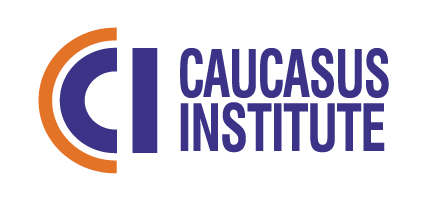Caucasus Institute organizes various events, round tables, conferences, trainings and seminars. These events are aimed at strengthening the bond between science and society, fostering pluralism and stimulating the transfer of research results.
Simulation game
POLITICAL CONFLICT MANAGEMENT AND NEGOTIATIONS
On November 30-December 3, 2017 the Caucasus Institute conducted a simulation game on political conflict management and negotiations in Aghveran, Armenia. The project was funded by US Department of State in the framework of Democracy Commission Small Grants program. The project aimed at enhancing the capacity of Armenian youngsters to get engaged in conflict resolution and political decision-making processes.
The simulation game modeled a current ethno-political conflict and helped the participants explore ways toward resolving the conflict. While completely fabricated, the situation presented in the game was based on facts and events from actual disputes that had occurred in the region. The role-play simulation game gave the participants a chance to see how perspectives and priorities can differ in important ways, and how dialogue and creative solutions can be possible even when conflict is complex and impassioned.
The four-day simulation game familiarized the participants with the complexities associated with conflict resolution and was conducted in English. Participants included 15 youngsters from 25 relevant CSOs and 10 universities (located both in Yerevan and in regions), 5 repatriates selected through the platforms of Repat Armenia, American University of Armenia (AUA) and Armenian General Benevolent Union (AGBU) and a total of 10 foreign participants selected from Turkey (four participants), Georgia (four participants), and Moldova (two participants).
Roundtable
POST-APRIL PUBLIC PERCEPTIONS OF THE NAGORNO-KARABAKH CONFLICT
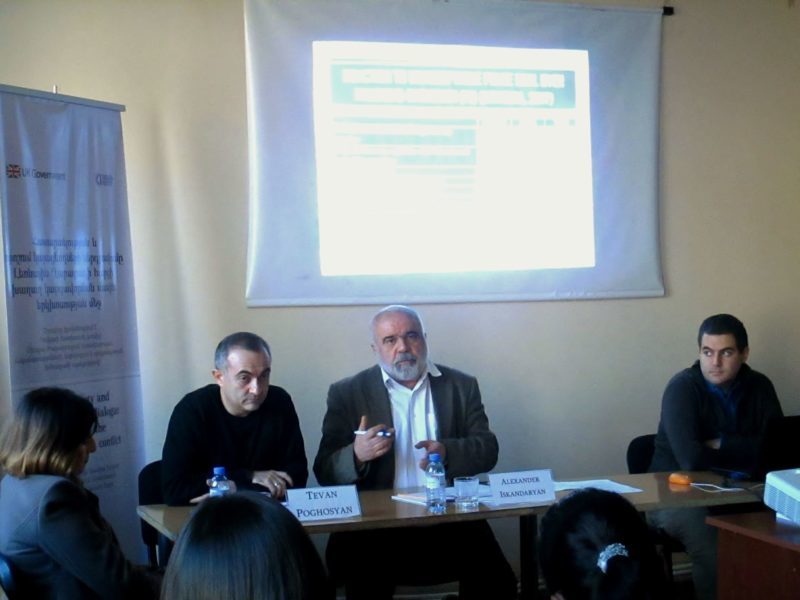
On November 27 the Caucasus Institute organized a roundtable on Post-April Public Perceptions of the Nagorno-Karabakh Conflict. Public perceptions of the Nagorno-Karabakh conflict in Armenia and Nagorno-Karabakh, its impact on the everyday life of residents of the conflict zone, and expert visions of conflict resolution prospects were the main topics of the discussion.
Hrant Mikaelian, CI Reserach Fellow, presented the results of opinion polls and nationwide surveys along with these of qualitative research conducted by experts from the Caucasus Institute in the framework of the project Engaging society and decision-makers in dialogue for peace over the Nagorno-Karabakh conflict. Tevan Poghosyan analyzed the findings. The presentations were followed by a Q&A section moderated by Alexander Iskandaryan, Director of the Caucasus Institute.
Hrant Mikaelian presented the results of the study and compared them with the findings of other surveys conducted in Nagorno-Karabakh, Armenia and Azerbaijan. Some of the key findings discussed at the event were that most people in Armenia do not believe in peace and think thatpreservation of status-quo is the most realistic scenario; the number of respondents who considera military solution to be realistic has increased, probably as a result of the April 2016 escalation; a vast majority of respondents in Armenia are not ready for territorial concessions; young Armenians aged 18-24 are the most likely to support a military solution of the conflict; and,finally, attitudes toward Azerbaijanis are getting worse – the common perception is that it will take decades and will require a change of generations to build normal relations.
Tevan Poghosyan, Head of the International Center for Human Development, pointed out the relevance and novelty of the study, since it gives a unique opportunity to get more information on what ordinary people engaged in the conflict think of it. In his words, this kind of event is a good occasion for discussing and analyzing national goals and elaborating a workable strategy. In his opinion, the strangest thing about public perceptions in Armenia is that in Yerevan military resolution of the conflict is seen as the most realistic scenario, whereas the population does not seem to be prepared for that. In addition, he was surprised by the fact that there are people who think that it is possible to make peace by ceding territories.
Tea Party
CIVILIZATIONAL AND POLITICAL CHOICES
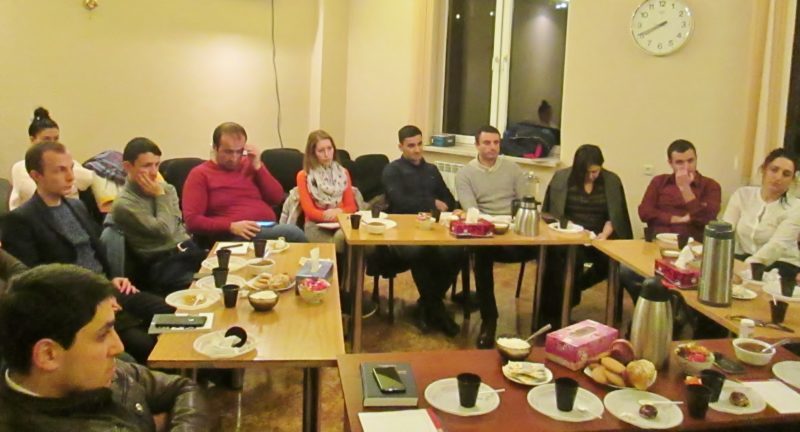
On November 23, 2017 the Caucasus Institute in cooperation with the Embassy of the UK in Armenia organized a tea party with young scholars and students in the framework of a series of informal discussions. The main topics of the discussion were the civilizational and political choices Armenia had to make in the course of its history, those it has to make in the 21st century (East-West dichotomy), especially ones on its cooperation with the EU and EAEU, and potential conflicts such choices may provoke. Alexander Iskandaryan, Director of the Caucasus Institute, was the moderator of the event.
The discussion was launched by the young participants trying to come up with their own ideas on the phenomenon of civilization, and then Mr. Iskandaryan opened the floor to exchange ideas on what civilizational choices are and whether they really can be made. Participants discussed what a civilizational choice is and whether it is at all possible to choose which civilization to join. Iskandaryan claimed that most often states make political choices that are wrongly perceived as civilizational ones, and that this is the case of Armenia and the EU treaty. In this regard, he added that it is political choices that provoke conflicts.
The participants recalled several episodes from the history of Armenia’s relations with European countries and the Russian Empire, and tried to understand what motivations Armenia had and what kind of conflicts it faced while building these relations. They actively debated the following questions: whether nowadays political and so-called civilizational choices are made consciously due to free access to information; whether institutional imitation may help in attaining characteristics of another civilization, and why these kinds of choices bring about conflicts.
7th Meeting of the Armenian-Georgian Forum
ARMENIA-GEORGIA COOPERATION:
OVERVIEW OF A QUARTER-CENTURY
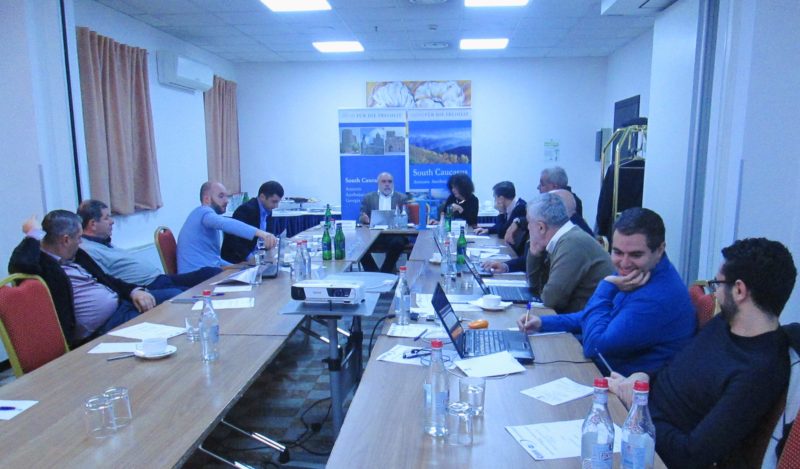
On November 17-19, 2017 the Caucasus Institute in cooperation with the Institute for the Study of Nationalism and Conflicts (ISNC) held the 7th Workshop of the Armenian-Georgian Expert Forum with the support of the Friedrich Naumann Foundation. The topic was the overview of a quarter-century of Armenia-Georgia cooperation.
The presentations and discussions were focused on social and political development of the two countries, mutual perceptions in the context of European integration, prospects and constraints for Armenia-Georgia cooperation. The Forum began with welcome speeches by Eva Tovmasyan, Junior Project Coordinator for Armenia, Friedrich Naumann Foundation in South Caucasus, Alexander Iskandaryan, Director of the Caucasus Institute, and Nino Kalandarishvili, Chair of the Board at ISNC, Tbilisi.
Professor Giorgi Gogsadze presented an overview of socioeconomic development in Georgia in the course of the last 25 years. He touched upon socioeconomic trends in Georgia reflected in such indicators as the ease of doing business, economic growth, and the results of surveys on public perceptions of economic development. Hrant Mikaelian, Researcher at the Caucasus Institute spoke about demographic trends both in Armenia and Georgia during the last two decades. Using official statistics and documents of both countries, he highlighted current trends and the inadequacy of the governments’ approach to resolving issues in this field. Executive Director of the Public Radio of Armenia Mark Grigoryan’s presentation was focused on the development of political system and emergence of political elites in Armenia starting from the first parliamentary elections in 1990. He discussed political heritage transferred from one generation of political elites to another, pointing out the links and differences amongst generations. Giorgi Kanashvili from the Caucasian House presented new trends in political system of Georgia after the parliamentary elections held in October 2017 and elections of the Mayor of Georgia. He also analyzed trends in political system during presidential terms of Saakashcvili and Shevardnadze pointing out to issues related to governance.
Giorgi Masalkin from Batumi Shota Rustaveli State University talked about perceptions of European integration among Georgians arguing that Georgians have a vague idea of Europe or European. He surmised that European integration is perceived either as a way to deprive Russia of its influence on Georgia or a means to gain unprecedented economic benefits. CI Director Alexander Iskandaryan’s speech was focused on perceptions of European integration in terms of formation of political system, especially the political party system. He compared these processes in both countries pointing out to their shortcomings and common features. He stated that it is impossible to develop healthy political party system just in 25 years, since it took Europe centuries to achieve its current stage of political development. Hence, Iskandaryan concluded that both Armenia and Georgia will gradually achieve positive results throughout this long process of political development.
At the end of the event the experts came up with recommendations concerning the topic of next meeting of the Forum and the format of the meeting.
Presentation
MICRO-BUSINESS AND SELF-EMPLOYMENT IN ARMENIA:
building blocks for entrepreneurship
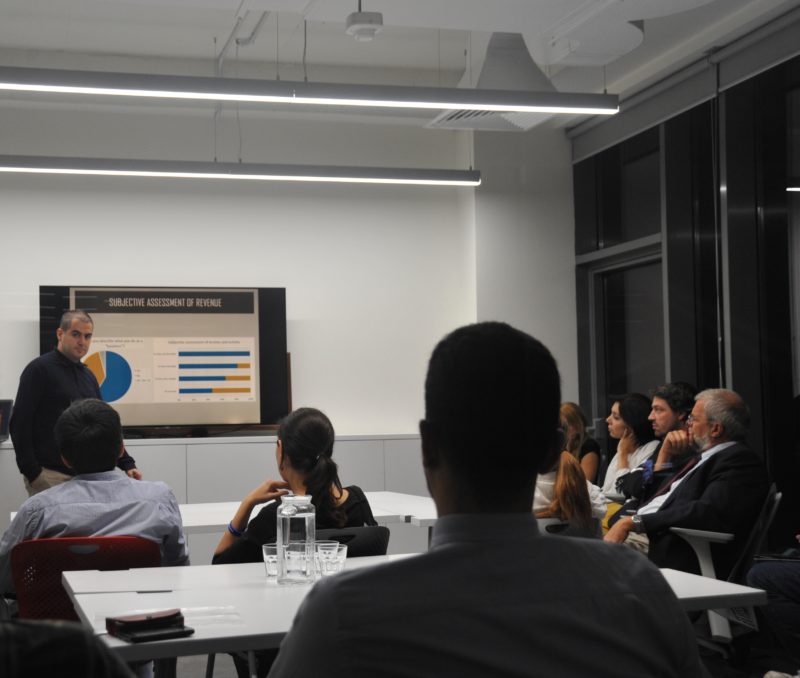
On October 12 the Caucasus Institute in cooperation with the Impact Hub Yerevan organized a presentation of the results of a survey of micro-enterprises in Yerevan, Armenia, Lori marz in Armenia, Georgia, and Kyrgyzstan.
Naira Vardanyan, Program Manager for Data Initiative at CRRC-Armenia, opened the event by pointing out to the importance of the topic for Armenia and provided the audience with background information. CI Expert Hrant Mikaelian presented the main findings of the study and the results of the analysis, while Philippe Rudaz, Economic Affairs Officer, UNCTAD, Switzerland, spoke about the results of the similar surveys conducted in Georgia and Kyrgyzstan.
Presentations were followed by discussion on comparative analysis of entrepreneurship perceptions in Armenia and Georgia, peculiarities of national cultures, and problems and perspectives of development of entrepreneurship in Armenia.
Roundtable
INDEPENDENCE REFERENDUM IN IRAQI KURDISTAN:
POLITICAL PECULIARITIES AND IMPACT ON REGIONAL POLICY AND SECURITY IN THE WIDER MIDDLE EAST
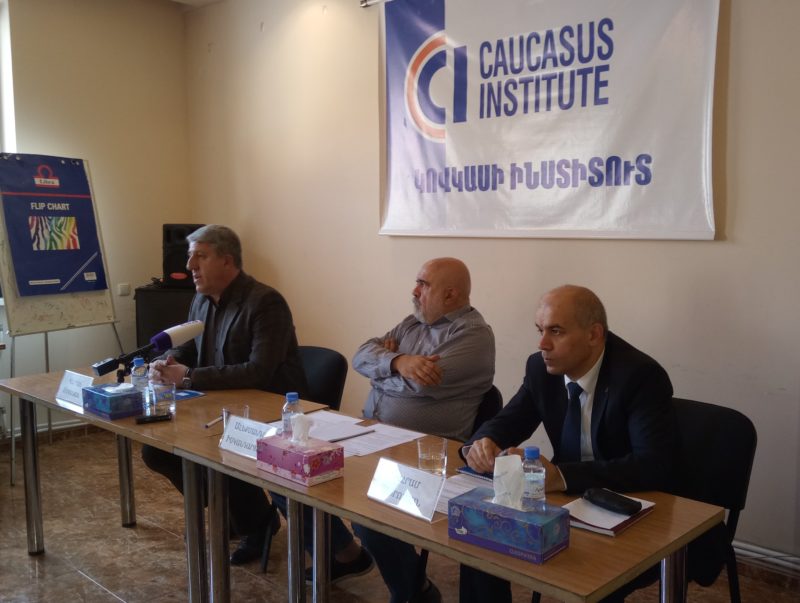
On October 10 the Caucasus Institute organized a roundtable on “Independence referendum in Iraqi Kurdistan: political peculiarities and impact on regional policy and security in the wider middle east.” Alexander Iskandaryan, Director of the Caucasus Institute, opened the event pointing out the importance of the topic for the region and Armenia. The discussion was launched by Dr. Vahram Petrosyan, Head of Chair of International Relations and Diplomacy, Yerevan State University, who reviewed the ongoing processes in Iraqi Kurdistan in the light of the independence referendum held on September 25. Then Dr Vardan Voskanyan, Head of Chair of Iranian Studies, Yerevan State University, discussed the positions of regional actors on the independence referendum in Iraqi Kurdistan, and presented in detail the relations of each of them with Iraqi Kurdistan.
Dr. Petrosyan spoke about the absence of consensus among Kurds on their future given their differences in language, culture, religion and political ambitions. Dr Voskanyan stated that Iraqi Kurdistan’s military and trade cooperation with Turkey led to alignment of Iran that had been supposed to exert great influence on Iraqi Kurdistan. He also argued that Israel’s support for referendum was conditioned by its interest in weakening Iran that is considered to be threatening Israel by, allegedly, sending troops to the Israeli-Syrian borders.
Dr Voskanyan also emphasized that, unlike that in Catalonia, the referendum in Iraqi Kurdistan was held peacefully, since the central authorities of Iraq are self-confident and strong enough. Besides, both Turkey and Iran preferred to stand by. In addition, Dr Voskanyan pointed out that it is senseless to compare the case of Nagorno-Karabakh with that of Iraqi Kurdistan, as Nagorno-Karabakh fought for its indepenence by acting in accordance with the Constitution of the state it was separating from.
The participants discussed the prospects of the independence referendum and its possible repercussions for the region and Armenia. Dr Voskanyan concluded that it is diffciult to predict what the referendum will result in, as despite change in political generations in Iraqi Kurdistan and their adherence to Western-style policy-making, the rivalry among different clans, ethnic and religious communities may inhibit any positive developments in the framework of state-and nation-building.
Tea Party
ISRAELI-PALESTINIAN CONFLICT AS A STUDY CASE
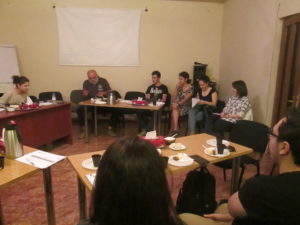
On September 28 the Caucasus Institute in cooperation with the UK Government’s Conflict, Stability and Security Fund held a tea party with young scholars and students. History of relations between Arabs and Jews, their ethnic differences and similarities, the phenomenon of Israel, its impact on the development of the Israeli-Palestinian conflict, and current approaches of the parties to the conflict were the main topics of the discussion.
The discussion was launched by the young participants trying to come up with their own ideas on the phenomenon of Israel and its role in the Israeli-Palestinian conflict. Alexander Iskandaryan, CI Director opened the floor to exchange ideas on common stereotypes about Israel and Israelis, and on peculiarities of state-building in Israel. The participants recalled stereotypes that are widespread in Armenia and tried to understand where they come from; what the role of these stereotypes in the development of the Israeli-Palestinian conflict is. The second part of the discussion was devoted to the analysis of the approaches of the two parties to the conflict, their strategies and reasons for success or failure throughout the years of the conflict.
Roundtable
SECURITY AND DIPLOMACY IN THE NAGORNO-KARABAKH CONFLICT: A NEW STAGE?
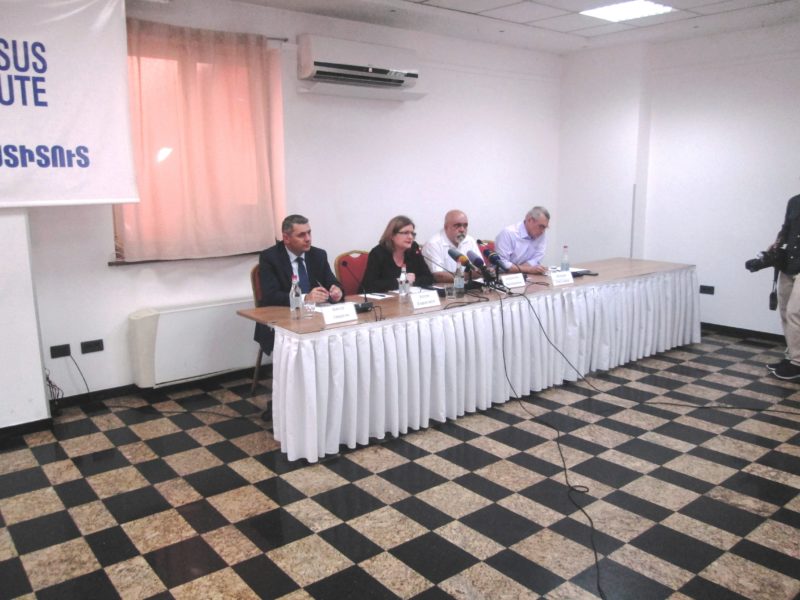
On September 11, 2017 the Caucasus Institute organized a roundtable on “Security and Diplomacy in the Nagorno-Karabakh Conflict: a New Stage?” The latest developments after the April escalation in 2016, diplomatic efforts within the OSCE Minsk Group and positions of the external actors involved in the conflict were the main topics of the discussion.
Judith Farnworth, Ambassador Extraordinary and Plenipotentiary of the UK to Armenia, opened the event pointing out that Great Britain supports the activities of the OSCE Minsk Group and promotes several programs with the aim of getting societies prepared for peace process. Richard Giragosian, Director of the Regional Studies Center, and Sergey Minasyan, Deputy Director of the Caucasus Institute delivered their speeches, followed by a Q&A section moderated by Alexander Iskandaryan, Director of the Caucasus Institute.
Mr. Minasyan spoke about the lack of real negotiation process in the framework of the conflict saying that nothing would change until there were border incidents and no trust mechanisms were introduced. Yet, he argued that after the April escalation in 2016 something happened that made people think of a new stage of the negotiations.
Mr. Giragosian pointed out that the OSCE Minsk Group was not able to make any significant changes in the negotiation process now as its members did not share responsibility equally. Moreover, the only office in the region was closed which, most probably, would have a negative impact on the peace process.
All of the participants were actively involved in the discussion asking questions mainly about involvement of external actors in the conflict, the role of decision-makers in the framework of the negotiation process and the relationship between decision-makers and society.
Public Lecture
EMERGING MARKETS AND POST-SOCIALIST ECONOMIC TRANSFORMATION.ARMENIA IN BROADER CONTEXT
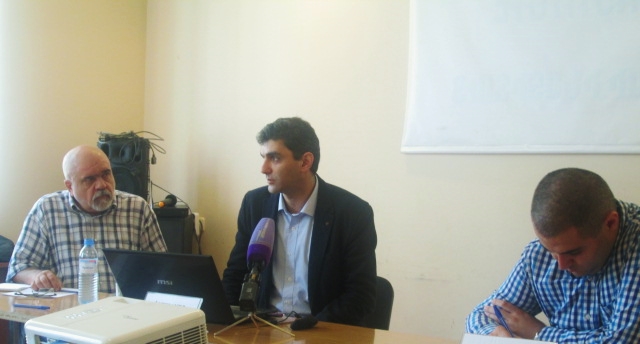
On July 31 the Caucasus Institute held a public lecture by Dr. Aleksandr V. Gevorkyan, Assistant Professor of Economics in the Department of Economics and Finance in the Peter J. Tobin College of Business at St. John’s University, USA, and member of the board of the Armenian Economic Association.
The lecture covered issues of ongoing transformation of post-socialist economies in the emerging markets context. The discussion focused on economic and social repercussions of transition to market economy; comparative analysis of economic transformation in post-Soviet and the countries of Central and Eastern Europe; as well as macroeconomic changes in Armenia. After the lecture participants asked Dr. Gevorkyan multiple questions, among those questions related to Armenia’s membership in Eurasian Economic Union and perspectives of Armenian economy.
Aleksandr Gevorkyan is a Senior Research Fellow at the Vincentian Centre for Church and Society and serves as Economics Subject Matter Expert for the Permanent Observer Mission of the Holy See to the United Nations. He has worked as a Visiting Research Fellow at the Central Bank of Armenia. Dr. Gevorkyan’s extensive teaching and research experience covers themes in macroeconomic policy, international financial economics, labor migration, and post-socialist transition economics. Dr. Gevorkyan is a co-editor (with Otaviano Canuto) of Financial Deepening and Post-Crisis Development in Emerging Markets (2016). He is the author of Innovative Fiscal Policy and Economic Development in Transition Economies (2011).
Tea Party
IMAGINED EUROPE: DIVERSITY AND CONFLICT RESOLUTION
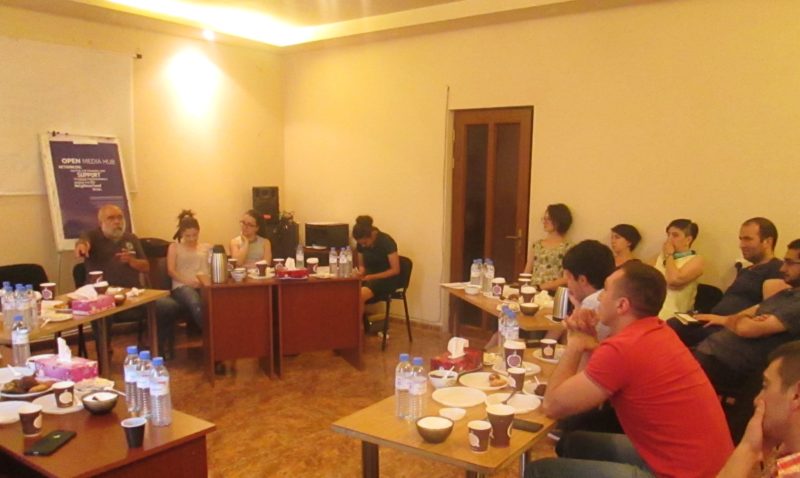
On July 27 the Caucasus Institute in cooperation with the UK Government’s Conflict, Stability and Security Fund held a tea party with young scholars and students. Europeans’ and non-Europeans’ perception of Europe, related stereotypes and the ways of dealing with conflict in Europe were the main topics of the discussion.
The discussion was launched by the young participants trying to come up with their own understanding of Europe by answering the warm-up questions about the words and images that come to their minds when they hear the word ‘Europe.’ Alexander Iskandaryan, CI Director opened the floor to exchange ideas on diversity (cultural, economic, religious, etc.) in Europe and its influence on conflict resolution in the continent. The second part of the discussion was devoted to specific cases of international conflict resolution in Europe starting from medieval times and ending with modern history.
Tea Party
CULTURE AND CONFLICT. WHAT IS THE IMPACT OF CULTURE AND CULTURAL DIFFERENCES ON ETHNIC AND ETHNO-POLITICAL CONFLICTS?
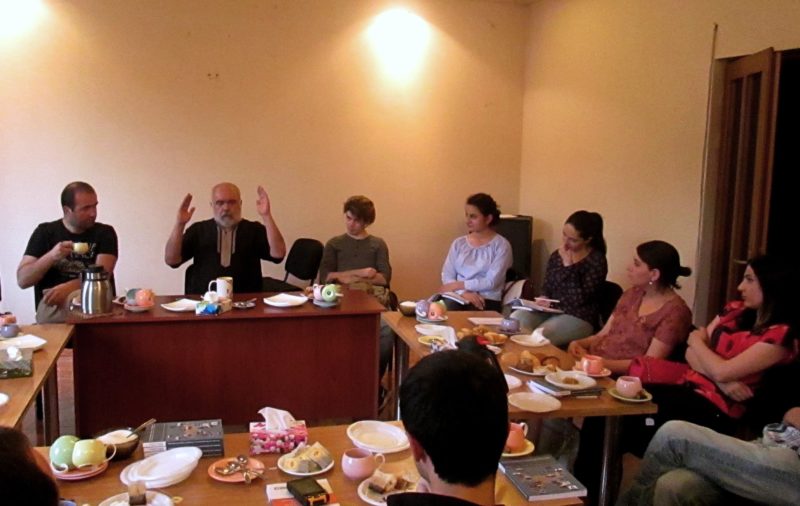
On June 20 the Caucasus Institute in cooperation with the UK Government’s Conflict, Stability and Security Fund held a tea party with young scholars and students. The party started with the warm-up questions about the definition and specifics of culture among nations and societies, which helped them come up with some common understanding of the topic. Then the moderator, CI Director Alexander Iskandaryan and the participants started to exchange ideas on the influence of cultural differences on perceptions of each other that were common for nations throughout centuries. The second part of the discussion was devoted to modernization in contemporary societies, the role of country’s history and geography in its national culture, the impact of mass propaganda on culture and the formation of national identity. The participants actively debated on the following questions: whether culture may influence on the formation of national identity in contradistinction to that of a historical rival; whether nowadays it is possible to keep national culture and undertake modernization; how nation’s historical past and geography shape its culture and behavior in the international arena; and whether culture can be changed due to mass propaganda.
International Conference
CAUCASUS-2016
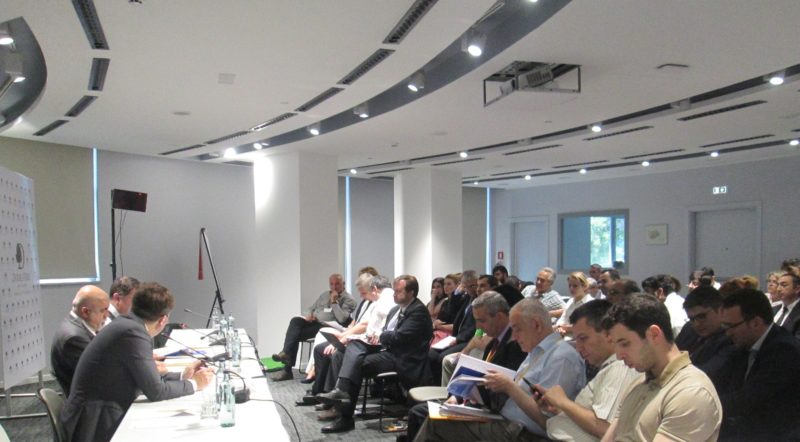
On June 9, 2017, the Caucasus Institute held its Annual Caucasus-2016 Conference that summed up the year 2016 in the South Caucasus. The conference was supported by the Swiss South Caucasus Foundation, the UK Government’s Conflict, Stability and Security Fund and the Embassy of Switzerland to Armenia.
The conference began with opening speeches by Judith Farnworth, Ambassador of the UK to Armenia, Lukas Gasser, Ambassador of Switzerland to Armenia, and Alexander Iskandaryan, Director of the Caucasus Institute. While Alexander Iskandaryan presented the main topics of the discussion, the ambassadors emphasized the importance of peace and security for the political and economic development of Armenia.
The conference consisted of three sessions: Main Trends in the South Caucasus in 2016 moderated by Sergey Minasyan, Regional and External Actors in the South Caucasus in 2016 moderated by Alexander Iskandaryan, and Dynamics of the Nagorno-Karabakh Conflict in 2016: Military Escalation, Diplomatic Realities and Political Prospects moderated by Sergey Markedonov. The first session was focused on domestic economic and political developments in the South Caucasus in 2016, including parliamentary elections in Georgia, the military escalation in Nagorno-Karabakh and the hostage crisis in Yerevan. The main topics of the second session were the South Caucasus countries’ relations with the NATO, the EU, Russia, Iran and China. Special emphasis was made on Russia’s policy towards regional states and its geopolitical interests in the region. The third session was dedicated to the military-political aftermath of the April 2016 escalation in Nagorno-Karabakh, and the roles played by various stakeholders in efforts to settle the conflict.
The speakers were
• Alexander Iskandaryan, Director, Caucasus Institute, Yerevan;
• Sergey Markedonov, Associate Professor, Russian State University for the Humanities, Moscow;
• Giorgi Masalkin, Associate Professor, Batumi Shota Rustaveli State University, Batumi;
• Masis Mayilyan, Ambassador-at-large of the Nagorno-Karabakh Republic, Stepanakert;
• Sergey Minasyan, Deputy Director, Caucasus Institute, Yerevan;
• David Petrosyan, freelance journalist, Yerevan.
• Alexander Skakov, Senior Research Fellow, IMEMO, Moscow;
• Fabrissi Vielmini, Associate Research Fellow, Eurasia Programme, Istituto di Alti Studi in
Geopolitica e Scienze Ausiliarie (IsAG), Rome.
Tea Party
THE NATURE OF ETHNO-POLITICAL CONFLICTS
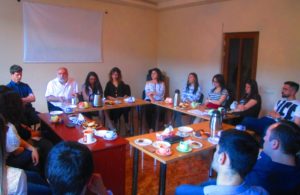
On May 31 the Caucasus Institute in cooperation with the Embassy of the UK in Armenia held a tea party with young scholars and students. The party started with the warm-up questions about the definition and specifics of ethno-political conflicts, which helped them come up with some common understanding of the topic. Then the moderator, CI Director Alexander Iskandaryan and the participants started to exchange ideas on possible causes of ethno-political conflicts, for example, traditional perceptions among nations and geopolitical interests of external actors. Trying to support their assumptions with convincing arguments, the participants appealed to well-known ethno-political conflicts. The end of the discussion was mostly about Nagorno-Karabakh conflict, its roots, the perspectives of its solution and the role of external actors.
Book Presentation
SHADOW ECONOMY IN ARMENIA
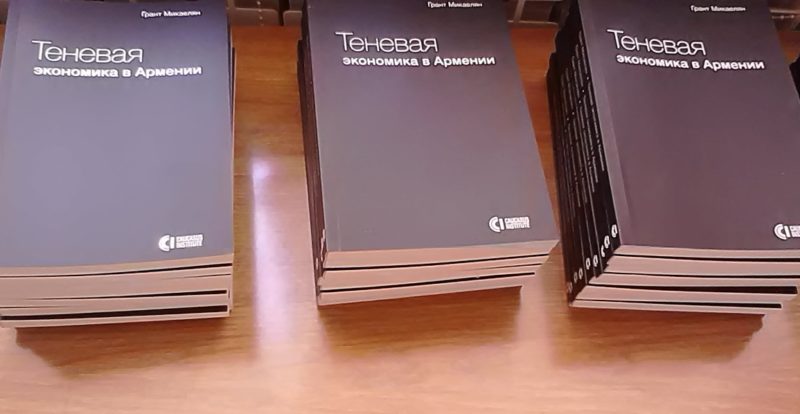
On May 25 the Caucasus Institute in cooperation with the Academic Swiss Caucasus Net (ASCN) presented their new book entitled Shadow Economy in Armenia, by CI senior research fellow Hrant Mikaelian. The book is based on a study of shadow economy in Armenia through the lens of sociology, political science and economics. It explores the patterns and emergence of shadow economy in Armenia, and elaborates on measures that can be used to reduce it.
CI Director Alexander Iskandaryan presented the book in a nutshell by shedding the light on the phenomenon of shadow economy as such. Then the author explained the process of the formation of shadow economy in Armenia starting from the Soviet times in detail by showing the respective data based on the calculations of international organizations and his own. The presentation was followed by a roundtable discussion, moderated by CI Deputy Director Sergey Minasyan, during which the participants asked questions that were mostly related to theoretical approaches to shadow economy and the prospects of fight against shadow economy in Armenia.
Simulation Game
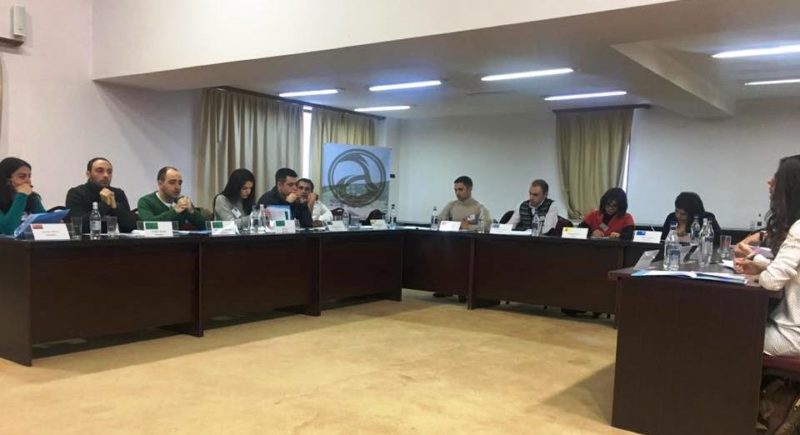 On February 2-5 the Caucasus Institute in cooperation with the Canada Fund for Local Initiatives held a three-day simulation game on ethno-political conflict resolution in Arthurs Resort, Aghveran, Armenia. During three days the 30 participants were negotiating on resolution of a conflict playing roles of senior officials of fictional countries. At the end of the game the participants were awarded respective certificates. The game was moderated by Nina Iskandaryan and Marina Saryan.
On February 2-5 the Caucasus Institute in cooperation with the Canada Fund for Local Initiatives held a three-day simulation game on ethno-political conflict resolution in Arthurs Resort, Aghveran, Armenia. During three days the 30 participants were negotiating on resolution of a conflict playing roles of senior officials of fictional countries. At the end of the game the participants were awarded respective certificates. The game was moderated by Nina Iskandaryan and Marina Saryan.
